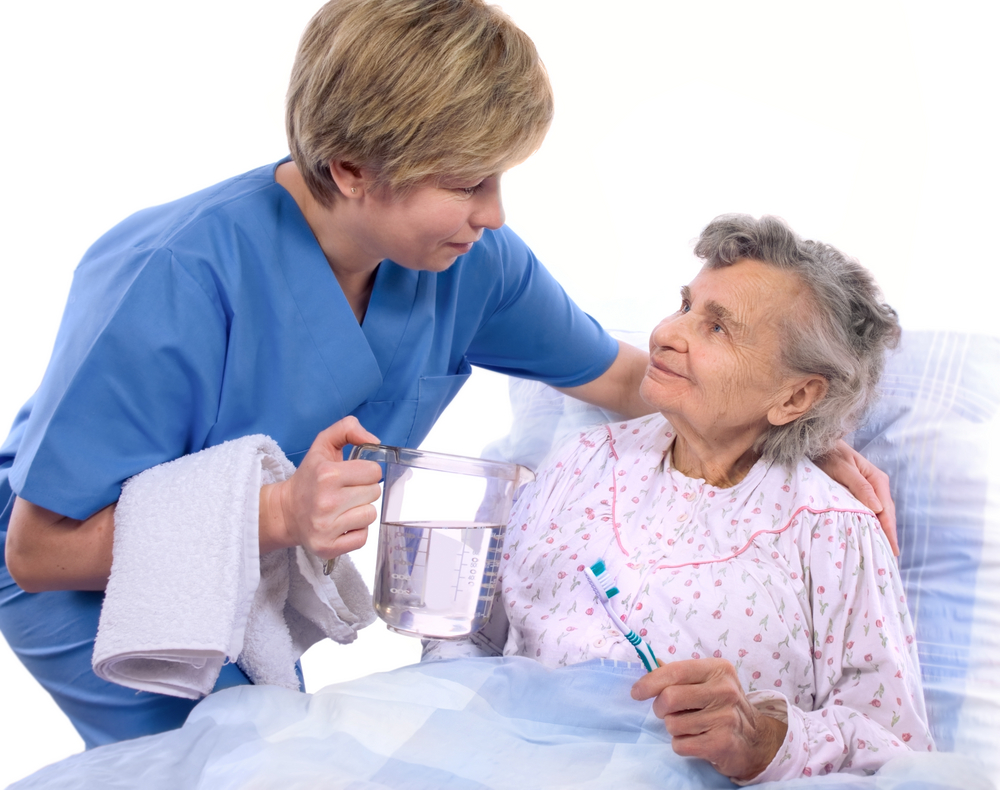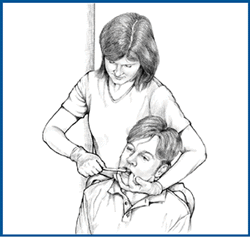When it comes to taking care of your aging parents, do you consider their dental health as well as their physical health? As parents continue to age, their ability to take care of their teeth tends to decline. This may be due to a loss of manual dexterity, arthritis, stroke, forgetfulness, or a lack of focus on their oral health. Caregivers, whether they are adult children or hired assistants, can play a major role in helping elderly adults maintain their dental health.
Make sure that your aging parent stays on schedule with their routine dental cleanings. Often these elderly patients need to come for more frequent visits, at least 3-4 times a year instead of only twice. If an elderly patient is unable to clean their own teeth due to injury (such as a broken wrist or arm) and does not have a caregiver who is able to clean their teeth regularly, the patient would benefit from monthly professional cleanings. This cleaning routine and the tips below also apply to disabled patients or those who are recovering from an injury that inhibits their dexterity.
A healthy mouth is an important part of overall health and well-being. Healthy mouths help keep patients free of infection and pain and promote the ability to eat well. Brushing is a critical part of maintaining a healthy mouth and applies to natural teeth as well as dentures and partial dentures.
Keys to brushing an adult's teeth:
1. Find a place and position that gives the caregiver easy access. Brushing does not have to be done at the bathroom sink. Sitting in a chair at a table is often the most convenient and accessible place. Have a towel, bowl, and a cup of water ready. You may have to try different positions for better access and/or visibility: Standing behind the patient gives you better control and accessibility; sitting knee-to-knee allows you to visualize where you are brushing. Comfort is key!
2. Skip the toothpaste or use a very small amount. When it comes to brushing, the mechanical action of removing plaque and debris is the main focus, so toothpaste is not necessary. If you do use toothpaste, pick one that contains fluoride and use only a pea-sized amount so that you don't overwhelm the patient. Some patients may not be able to swallow well or may have an aversion to the strong taste of toothpaste. Don't let a lack of toothpaste prevent adequate brushing!
3. Select the right toothbrush. Soft bristles and a handle that's easy to hold are the key features. A children's toothbrush may allow easier access to posterior teeth. Electric toothbrushes have larger handles and are often easier for a caregiver to hold. Many also find that adapting the handle on a manual toothbrush aids control. This can be done by wrapping a washcloth around the handle, attaching a bicycle handle grip or Styrofoam tubing to the base of the toothbrush, or cutting a hole in a tennis ball and attaching it to the end.
4. Brush gently. Take care to angle the toothbrush toward the gumline and gently brush the gums. Pay attention to the backs of the teeth, the spaces between them, and the folds of the cheeks where food easily gets trapped. Swipe the cheeks with a gloved finger or cotton swab to remove any food deposits. If the patient wears dentures or partials, remove them before brushing and be sure to clean the dentures and partials before replacing them.
Flossing is also a key part of oral hygiene, especially for older adults who often have larger gaps between their teeth due to gum recession. However, flossing often becomes more difficult for aging adults due to the loss of manual dexterity and precise movements that are required. Caregivers can always use regular floss to clean between the teeth, although it takes some practice and may feel awkward. Other options are floss holders with longer handles that are easy to grip, inter-dental brushes (these small pointed brushes clean between the teeth at the gumline -- but never force them!), or a WaterPik.
Helping your elderly parent maintain proper oral hygiene will go a long way towards making them more comfortable and avoiding dental pain and problems. It may take some practice to find the best positioning and technique, so don't get discouraged. As a caregiver you are providing an invaluable service!
Feel free to ask us questions about homecare for your aging parent the next time you bring them in for their routine appointment at Jacques Dentistry in Greenville, SC . We are happy to demonstrate positioning and techniques that will help you as you care for your parent.




